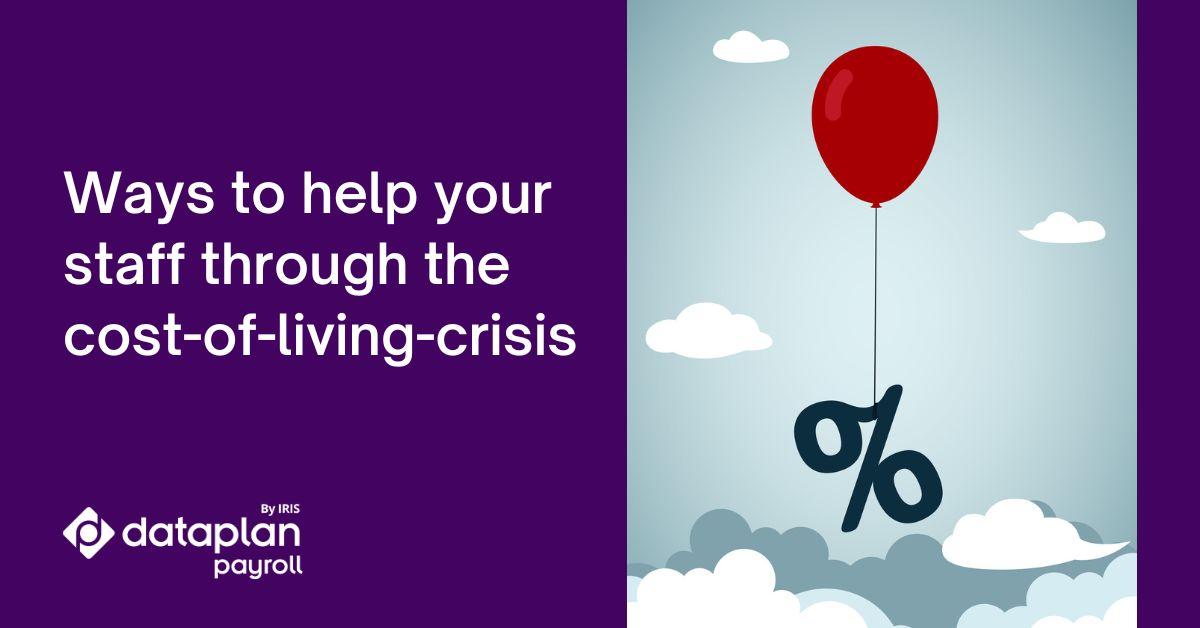
Paul Chappell, Head of Legislation and Compliance at Dataplan, talks about how businesses can help staff during difficult times.
The cost-of-living crisis is taking its toll on many people, and this likely includes your staff.
For some, it has resulted in a real worry about whether they can heat the house or keep the lights on. Because of this, many employers are looking to see what they can do to help their teams.
How urgent is the cost-of-living crisis?
According to the UK Government, 93% of people reported the cost of living had increased for them in October 2022 compared with a year ago. Eighty percent said their costs had gone up in the last month.
Almost as many (79%) are worried about the cost-of-living situation, and 67% of people are trying to cut expenditures on non-essentials. Sixty-three percent are using less fuel, like gas and electricity.
One in every 50 people say they are looking for support from charitable initiatives, such as food banks.
Your first instinct might be the wrong instinct
Payroll and tax know-how play a pivotal part in helping staff. The right staff benefits can be an important boost to those who need them, but the wrong benefits will result in a financial hit to those already struggling.
For example, an immediate instinct to give staff a bonus might seem like the best way forward, but it could cause trouble. A bonus might cause issues with means-tested payments such as Universal Credit, which are based on the final figure paid into people’s accounts. This could mean payment from a business intended as a temporary uplift could result in people being cut off from other essential cash lifelines.
Of course, handing out bonuses can also affect a business's cash flow – and organisations face many of the same increasing costs as the individuals they employ, with implications that can affect hundreds if not thousands of people. This means bonuses can create a major bump in the road for the corporate bank balance.
So, how can you help employees without triggering adverse effects?
The crucial part payroll plays
There's a chance you are already offering important benefits to staff, and there are ways to build on these to provide a boost to the employee and your business.
Salary sacrifice lets people increase existing workplace benefits (so it could be the workplace pension, medical insurance, or a whole host of other possibilities) by cutting their official annual pay. Salary sacrifice done right can actually result in an increase in take-home pay. This is because by allowing someone to sacrifice salary for their benefits, they give up taxable money; because that person's salary is then lower, their tax and National Insurance contributions fall. The employer also makes a saving on National Insurance – and if this is part of a pension arrangement, they can add this to money paid to the provider.
There are other ways to leverage staff benefits that cost less, enhance a business, and don’t incur tax. For example, by providing all staff with mobile phones – a tax-deductible business expense – it will free your workers from costly personal phone tariffs, allow them to improve communication at work, and be better for business cash flow than giving employees a sudden lump sum.
Payroll and tax insight also makes it possible to put food on staff tables without triggering taxes. For instance, food and shopping vouchers are listed as "trivial" benefits, meaning they fly below the tax radar (up to a limit of £50). And, if you have a canteen, then, as long as the food is of a reasonable value, it can be provided free, subsidised, or paid for with the help of vouchers.
It is also worth noting that period products can also be exempt from payroll taxation if made available. Needless to say, helping with a regular expense such as this can be a massive help for those staff trying to balance their budgets.
How hospitality businesses can help
If the business is in the field of hospitality, there are more things that can be done to benefit staff with minimal expense to the company.
Using a compliant tronc scheme benefits the business and your employees as it negates the need to pay employer and employee National insurance on pooled tips. This will save £12 in every £100 of tips for your employees, and save your business the cost of £13.80 per £100 being paid through your payroll.
Tronc schemes can be complex, however, and the risk of getting it wrong could mean that HMRC could claim back up to 6 years of National Insurance payments from both the employer and employee. This is why so many businesses look to use an independent specialist Troncmaster Service.
A word of caution
Getting staff pay wrong, especially during tough times, can mean difficulties for your employees and your business.
We have seen how a bonus or pay increase can have a negative impact, but there are other pitfalls. For example, a business, through inattention, can cut someone’s pay to below minimum wage at a time when they need every penny.
How? Let us take the example of salary sacrifice, where staff pay is diverted to benefits like a pension or a car. A miscalculation of pay or hours could mean that the staff member sees their money drop below the legal threshold for the National Minimum Wage.
This money must go back to the employee, and it has to happen as soon as possible. Depending on when and where the investment was made on behalf of the staff member, it is possible it might be non-refundable to the business.
Salary sacrifice also means a lower salary on paper. If, for example, a loan application, like a mortgage, depends on a salary figure (and not real take-home pay, which can be higher under salary sacrifice because of National Insurance and tax savings), then it could unintentionally affect major life events.
Statutory sick pay and maternity pay may also be affected by lowered earnings. The government says people risk losing such pay altogether if enough care is not given.
Of course, salary sacrifice is just one area where a business can make major mistakes that are difficult to undo.
Get advice
There is not one, all-encompassing answer to making things better for your staff. Rather, it takes a clear understanding of the full range of benefits you can offer and a technical understanding of how they are implemented.
Needless to say, during this difficult time many businesses must focus on other priorities, like improving the bottom line, so everyone stays in their job.
It is often a smart move to bring someone else on board to help. Dataplan has worked with payroll for over half a century and has the expertise to help businesses plot their path through turbulent times.
